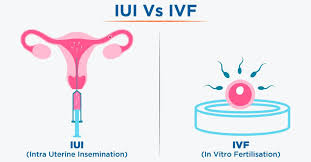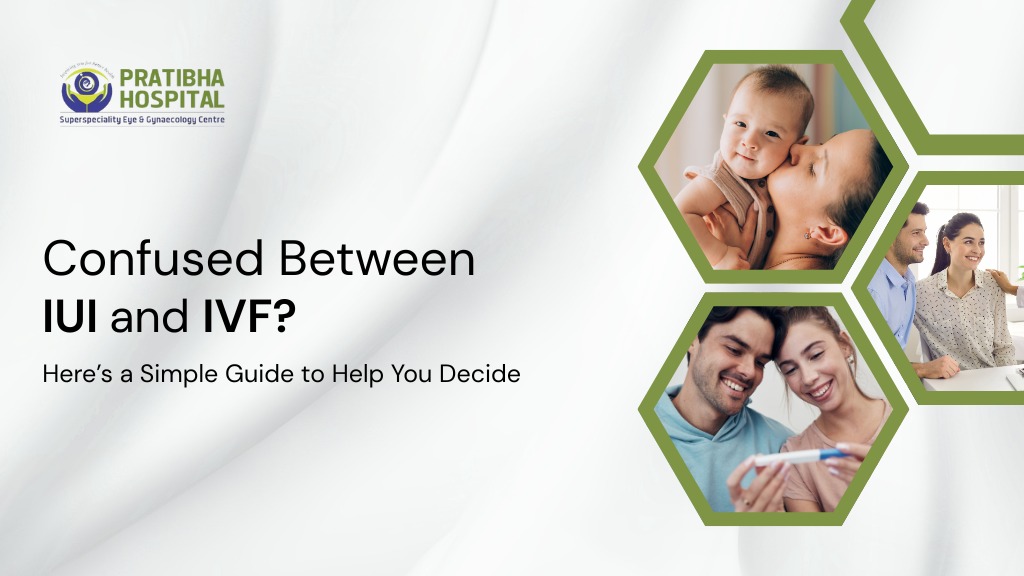IUI vs IVF: Key Differences
Fertility treatments can feel too complicated, especially when the terms are heard like IUI and IVF. Both methods are widely used all over the world to help the couple conceive, but both methods are different from each other in terms of process, suitability, and success.

Now, the next question that will arise in your mind is, what is the difference between IUI and IVF?
Keep reading this blog to clear things up in the simplest way possible.
IUI (Intrauterine Insemination)
IUI is a successful treatment option for those couples who are looking to conceive. in this process, the sperm of the male partner is directly placed in the uterus of the female partner in a medical condition during the ovulation period of women. If the male partner is directly placed into the uterus of the female partner during the period of ovulation.
so that the sperm will get closer to the egg and the chances of fertilization will increase.
When is IUI suggested?
Doctors often recommend IUI in the following cases:
- Mild problems with sperm count or movement
- Unexplained infertility
Also read: What Is the Major Cause of Infertility?
- Difficulty with timing intercourse
- Use of donor sperm
- Mild endometriosis
Here, the IUI treatment procedure can be done with or without medication.
In the case of medication, the fertility medicines are given to women for more egg production, and in the case of no medication, the eggs are produced naturally. The ovulation is tracked through ultrasound and blood tests, and when the doctors find all is well, they decide on a perfect day to do IUI, where they collect the sperm and insert it into the uterus directly.
The IUI Process:
- Ovulation is tracked or stimulated with medication.
- Sperm is collected and washed to remove any impurities.
- The best-quality sperm is placed into the uterus using a thin tube.
- The sperm meets the egg naturally inside the body.
IVF (In Vitro Fertilization)
IVF is a more advanced treatment than IUI, as in this, the fertilization process is executed in the laboratory.
Let’s understand how, in this, the eggs are collected from the ovaries and then fertilized with the sperm in the laboratory, and when it becomes an embryo, it is placed in the uterus of the woman.
When is IVF recommended?
Doctors advise IVF treatment in certain cases when:
- Blockage in the fallopian tubes
- There’s severe male infertility
- IUI or other treatments haven’t worked
- A couple wants to use genetic testing (PGT)
- The woman has a low egg count, and her age is above 35.
IVF also helps in cases where one or both partners have a known genetic condition, as embryos can be tested before being transferred.
The IVF Process:
- Fertility injections are given to produce multiple eggs.
- Eggs are collected from the ovaries through a minor procedure.
- In the lab, sperm are mixed with eggs for fertilization.
- After 3–5 days, a healthy embryo is transferred into the uterus.
- A pregnancy test is done after about 10–14 days.
What Is The Difference Between IUI And IVF?
The biggest difference is where fertilization happens.
- In IUI, it happens inside the body.
- In IVF, it happens outside the body, in a lab.
Here’s a simple table to compare the two:
| Aspect | IUI | IVF |
| Fertilisation happens | Inside the body | In the lab |
| Invasiveness | Minimal | Involves procedures |
| Use of medications | Often mild | Requires strong hormonal injections |
| Time taken | Short process | Takes 2–3 weeks per cycle |
| Cost | Less expensive | More expensive |
| Success rate | 10–20% per cycle (varies) | 40–60% per cycle (varies with age) |
| Best for | Mild fertility issues | Complex fertility problems |
Is IUI or IVF More Successful?
The rate of success makes the difference in the treatment options for fertility discussed.
The rate of success in IUI is between 10% and 20%, depending upon the health condition of the woman, age, and the severity of the fertility issue.
On the other hand, IVF enjoys a higher rate of success, which is 40% to 60%, and it works magically in young women, but if the age is more than, like, 35, then the rate of success gets slightly lower.
Generally, what happens the doctor advises going through with 3-4 cycles of the IUI, and if it is not successful, then go for IVF.
But in certain cases, like blocked fallopian tubes or very low sperm count, it may be better to directly go for IVF.
When To Decide To Go For IUI?
IUI is a good option when:
- The woman is under 35
- The sperm count is slightly low but not severely
- There are no major female fertility issues
- You are just starting fertility treatment and want a simpler approach
It’s a good first step before going into more complex treatments.
When to Go for IVF?
IVF may be the right choice if:
- You’ve already tried IUI multiple times without success
- The woman is over 35 or has low ovarian reserve
- The fallopian tubes are blocked or damaged
- The male partner has a very low sperm count
- You want to use frozen eggs, donor sperm, or do genetic testing
It gives more control over the process and is often the best choice when other methods don’t work.
Does IUI Turn Into IVF?
Not always; it depends. like as discussed above, the doctor always recommends going for IUI if the fertility issue is easy to manage, but if the condition is beyond the common causes, then IVF is needed.
There are many couples who first give IUI a try, and in case success is not achieved, they are then left with the option of IVF.
Which One Feels More Comfortable?
Still, many couples find IVF manageable, especially when guided properly by the doctor.
IUI is usually painless and quick. No surgery is involved. You may feel mild cramping after the procedure, but that’s about it.
IVF involves more steps and minor surgery (for egg retrieval). It includes the intake of regular hormonal injections and careful monitoring.
Still, many couples find IVF manageable, especially when guided properly by the doctor.
Conclusion
Both the treatment options, IUI and IVF, are best in their place; it depends on the woman’s fertility problem, which decides which treatment option is the best fit for conceiving.

In short, IUI is for Mild fertility problems, and IVF is for severe fertility issues.
Talk to your concerned doctor, share your problem, and make an informed decision for your health and parenthood journey ahead.







